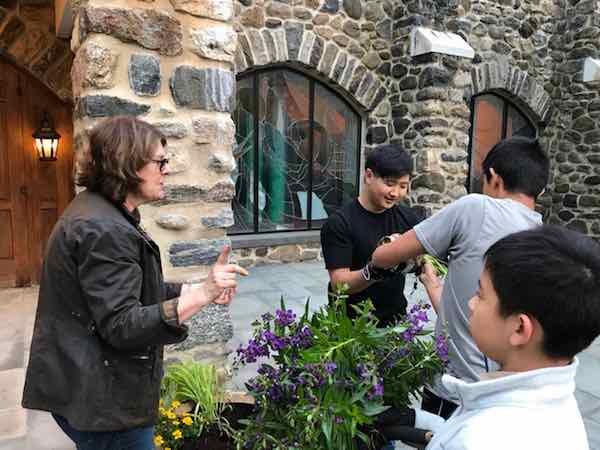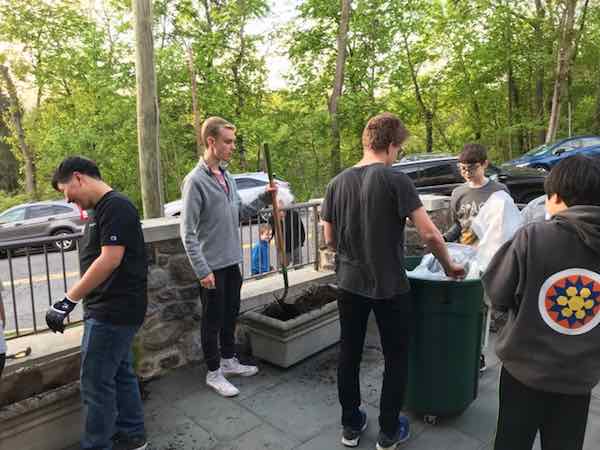Scarsdale Alternative School Celebrates 28 Graduates
- Details
- Written by: Aerin Gelblum
- Hits: 5606

Students gain admission into the A-School through a lottery system, but it takes much more than good fortune to build the strong community that the class of 2019 helped create. Intimate meetings in core groups, weekly community meetings with everyone in the program, and bonding events such as “Outing” all strengthen the bonds between students and contribute to the experiential learning that is the foundation of SAS. There are many opportunities for student leadership positions, and classmates work together on committees to plan events. In this way, students are encouraged to take control of their education in both their democratic community as well as in their co-curricular pursuits. The Internship Program—which all SAS students participate in each January—is perhaps the hallmark of the Alternative School. The program urges students to take initiative and secure internship positions, thus gaining work experience, developing a greater sense of independence, and delving deeply into one’s interests. The internships also serve as a method for teachers to get to know their students better as they watch them struggle and triumph in real-world scenarios. The close faculty-student bond was apparent in the many speeches given by teachers that recalled students’ internship endeavors through their multiple years in SAS.
The first of the five SAS teachers to address his core group was Mike Giordano, whose personal speeches articulated students’ character and interests. His presentations celebrated the personal growth of the graduates, and he shared his perspective of having watched them enter the Alternative School as quiet and reserved only to emerge as strong and confident leaders and role models. Mr. Giordano also touched on the talents and values of the group, noting Julia Loten’s, “gift for gracefully weaving words together,” and how Isabella Stewart, “exemplifies the A-School value of learning for learning’s sake.” Mr. Giordano presented Margaret Brew, Ian Lerner, Julia Loten, Isabella Stewart, and Sophie Weingrad with their diplomas following each of their individualized speeches.
Jennifer Maxwell emphasized the diversity of the class when speaking to her group of seniors. Citing interests ranging from legal studies to music production, Ms. Maxwell shed light on how each of the graduates learned from each other, and how the students’ experiences in SAS were enhanced by their individuality. Her speeches presented the Alternative School as anything but homogenous: an environment where an array of mindsets can find common ground. Ms. Maxwell referenced the students’ self reflections, where Ella Ansell wrote, “I welcome mistakes, as these are essential for improvement” and Simon Bradlow considered how he had become, “a more welcoming, accepting, and understanding person.” She presented Anshu Ajmera, Ella Ansell, Simon Bradlow, Sam Hoffman, Kate Nova, and Hayden Seidman with their diplomas.
One of the most unique and thoughtful moments of the ceremony was Senior Speaker Isabella Stewart’s address to the class. Like many other positions in the A-School, Isabella was voted into giving the speech by her fellow seniors. She described SAS as a “big, beautiful mess”—a community that finds opportunities for learning and growth in patches of chaos. Isabella noted some of the most important lessons she had gained throughout her years in the A-School as being trust, respect, and passion, but she also centered on the importance of disagreement as a catalyst for personal and community improvement and togetherness. Perfectly summarizing the micro-society that is the A-School, Isabella told her class: “we are a colorful mosaic of human life.”
Instead of traditional speeches, Fallon Plunkett presented the seniors in her core group with spoken letters. In them, she opened up about the graduates’ best qualities, notably mentioning Paige Barlow’s sincere empathy, Ross Forman’s admirable humility, and Fletcher Faden’s “thirst for social justice.” Ms. Plunkett spoke to the impressive efforts the seniors have made to improve SAS after they leave, specifically a mentor program ideated by Avery Rubin that will be implemented next year. She also designated a book for each student that encompassed their personalities and whose messages would serve them well in the next phase of their lives. Ms. Plunkett then presented diplomas to Paige Barlow, Nathan Bookvar, Fletcher Faden, Ross Forman, Kimberly Markowitz, and Avery Rubin. Before leaving the podium, she presented teacher Sheilah Chason with a letter of her own, commemorating the occasion of her last year as an educator in the A-School. Ms. Plunkett expressed gratitude on behalf of the entire A-School for her deep care of the program and meaningful relationships with students, and Sam Hoffman affectionately commented, “Sheila is the mother of the A-School.”
Ms. Plunkett’s address to Ms. Chason underlined the significance of impactful teaching. While SAS does put students in the driver’s seat, student academic and civic engagement wouldn’t be nearly as strong without the guidance of truly caring teachers. The five advisors particularly honored four students as recipients of unique awards. Ian Lerner and Anshu Ajmera were presented with the Senior Project Award for the dedication, creativity, and passion they poured into their senior projects—SAS’ version of Senior Options. The advisors selected Kate Nova and Grace Vericker as the recipients of the Tony Award—the A-School’s highest honor that recognizes those who most embody the principles of the program. They applauded Kate for having always stood strong in her principles of fairness and equality, and celebrated Grace for her empathy and deep relationships with others.
Having made over fifty A-School graduation speeches over the past nine years, Ms. Chason presented her final round of recognition to Lindsay Donat, Aidan Londa, Kodai Morikuni, Dan Silk, and Grace Vericker. Like the other advisors, Ms. Chason did not hold back in her praise for the graduates, occasionally pausing her speeches to collect her emotions. She shared a particularly meaningful internship experience had by Dan, who played guitar for patients at Northern Westchester Hospital. Dan would always engage with those he played for, and would leave their rooms graciously offering to one day return. His constant smiling did not go unnoticed, she added, as well as his ability to light up any room.
Jeanne Cooper addressed Morgan Costello, Natalie Gee, Liana Givner, Zachary Reyman, Jonah Schneider, and Alexandra Wilson. Ms. Cooper shared with the room some of the deep wisdom that had been imparted upon her by the members of her core group. She noted one of Zachary’s reflections that states, “a life can change drastically, potentially forever, in the lifespan of a single doctor’s appointment,” and a research paper written by Alexandra that addressed how, “becoming more mature means accepting that the world is more morally ambiguous than we thought when we were younger.” These students exemplify the SAS principle of growth outside the classroom walls, and Ms. Cooper expressed her appreciation for all that they have taught her.
It has been said that graduation ceremonies are one of the most purely happy events one can attend, and the Scarsdale Alternative School graduation was no exception. Beautifully unconventional and profoundly moving, the ceremony gave well-deserved recognition to the best and brightest that Scarsdale has to offer: both the program itself, and, of course, the SAS class of 2019.
All in the Family: Mother-Daughter Real Estate Teams
- Details
- Written by: Joanne Wallenstein
- Hits: 10898
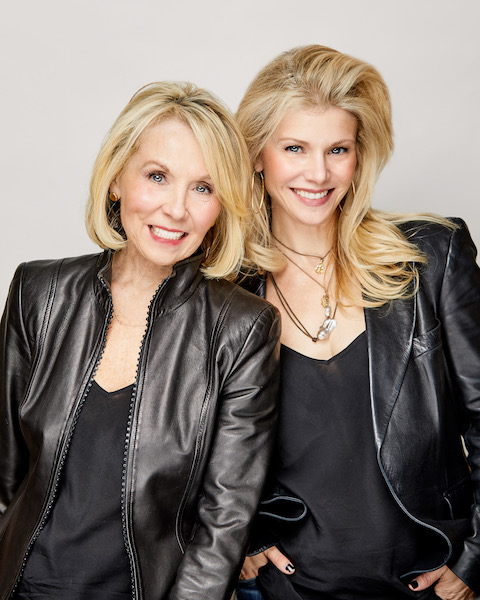
Here are the stories of a few of Scarsdale’s family teams:
Ashley and Sandie Badger (pictured at left)
Thirty years ago Sandie Badger parlayed her volunteer and fund raising experience into a second career in real estate and has worked at Julia B. Fee ever since. As a little girl, daughter Ashley remembers helping her mother print brochures for open houses.
Ashley worked in global communications for the fashion and beauty industry for 20 years before making the transition to join her mother at Julia B. Fee. Speaking about Ashley, Sandie said, “Her keen eye for style and design make her a natural in real estate. Having grown up in Scarsdale and knowing the community inside and out made it an easy decision for Ashley to join Julia B. Fee Sotheby’s International.”
Ashley says, “Sandie has taught me so many lessons, and it’s ongoing. The most important lesson: ‘Be yourself, embrace change and every day is a new day.’ Scarsdale is such an extraordinary community and we are so very proud to be a part of its continued prosperity.”
Jennifer Stone Fischman and Sheila Stone
Sheila Stone has been selling homes in Scarsdale since 1972 and daughter Jennifer Fischman and her brothers were part of their mother’s team. Jennifer says, “My earliest memories of my mother selling real estate include times that 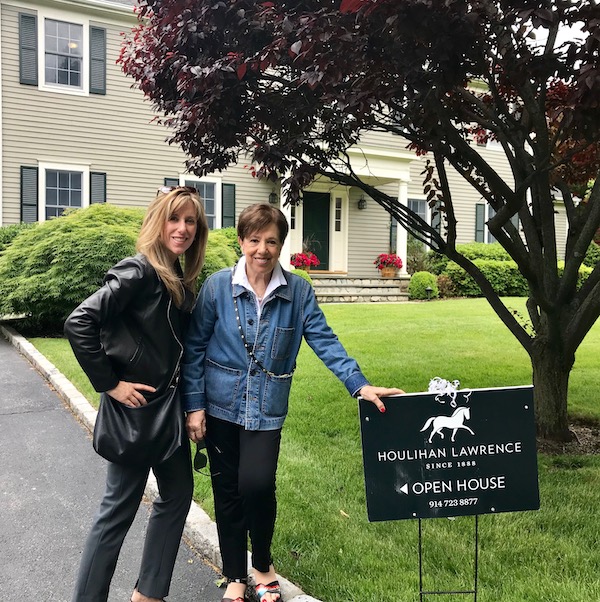 Jennifer Fischman and Sheila Stoneshe took me with her to meet clients and see houses, I was probably 5 or 6 years old. Sometimes, before there were cell phones, I remember she was pretty unreachable during the day because she was always out of the office showing houses to clients. My brothers and I did small jobs at all the houses she was trying to sell, like cleaning the bathrooms or washing the windows, cleaning out garages and gardening. Then, after I graduated college and lived in NYC, I used to come up to the office on the weekends and answer phones and take photographs of the houses and create brochures.”
Jennifer Fischman and Sheila Stoneshe took me with her to meet clients and see houses, I was probably 5 or 6 years old. Sometimes, before there were cell phones, I remember she was pretty unreachable during the day because she was always out of the office showing houses to clients. My brothers and I did small jobs at all the houses she was trying to sell, like cleaning the bathrooms or washing the windows, cleaning out garages and gardening. Then, after I graduated college and lived in NYC, I used to come up to the office on the weekends and answer phones and take photographs of the houses and create brochures.”
When Jennifer decided to leave her 20-year career as a corporate lawyer to join her mom, Sheila says, “There were no other mother/daughter teams that I knew of, but I was excited to have Jennifer come into what we consider, “our family business. For me, at this stage in my career, it has allowed me to continue to do the job that I love.”
As for Jennifer, she says, “My mother has been doing this business for over 40 years and though a lot has changed over that time, one thing remains and that is that this business is built on personal relationships with clients and the services we provide to them. We recently we had the opportunity to sell a house in Scarsdale to the child of one of my mother’s favorite customer’s to whom she had sold a house Scarsdale in 1983 (and 2 more after that). This experience exemplifies why the real estate business is so gratifying, because it creates ever lasting relationships that can even transcend generations.”
What do the two predict for the market? “We expect the market in Scarsdale to remain strong as always. We have seen a real rebounding in the last couple of months, with interest rates remaining low and the stock market strong. People continue to love living in our community and we encourage others to follow!”
Check out Jennifer’s website, “Scarsdale Secrets” where she and her husband have been writing about unique facets of Scarsdale history.
 Bonnie Besner and Susan FieldSusan Field and Bonnie Besner
Bonnie Besner and Susan FieldSusan Field and Bonnie Besner
Mother daughter team Susan Field and Bonnie Besner tell clients that they have the county covered with Susan at Houlihan Lawrence in Scarsdale and Bonnie in the Briarcliff Manor office. While Field works in Scarsdale and neighboring towns, Bonnie covers the up county areas of Briarcliff Manor and Croton.
Even before Bonnie moved up from NYC to join her mother, she helped her to sell a home. She says, “A number of years ago when she listed my sister’s house in Somers, I thought one of my close friends would love her house. On my suggestion she took a look and ended up buying it only days after it hit the market. Hmm…does that mean I’m overdue for a referral fee?”
Says Susan, “The advantage of having Bonnie on my team is clearly that she “has my back”. As Bonnie and I have different schedules since she has a 4 ½ year old son, I am able to pitch in when she is busy and she can do the same for me.”
Here are some important lessons Bonnie has learned from her mother:
-You’re only as good as your reputation. It’s wonderful to be respected in the industry. Respect can give you the edge when negotiating.
-No deal is too small; you never know what it will lead to.
-Always respect everyone and know that no matter what price range a buyer is in, it’s their biggest purchase.
What does Susan predict down the line? Field says, “With her son in nursery school, she is networking with young people who have real estate needs as their families grow. Being as involved as she is with her peers is a good thing for business. She’s on the Board of her condo development in Briarcliff and a class parent in nursery school. She’s outgoing and personable, and she just cares. If this is a reflection of me, I am very proud.”
Angela Retelny and Jessica Retelny Shames Angela Retelny and Jessica Retelny Shames
Angela Retelny and Jessica Retelny Shames
After leaving a career as a real estate executive in Florida, Angela Retelny moved to Scarsdale and was hired as the Marketing Associate at Julia B. Fee. Three years later she moved into sales and says, “I loved it from day one and never looked back!” Daughter Jessica took a similar path. After working in the licensing division of Marvel, she joined the start up Platinum Drive Realty to handle their advertising, marketing and social media. When Platinum Drive was sold to Compass, Angela and Jessica decided to form their own team at Compass.
Angela enjoys “the opportunity to be with my daughter every day and interact on a professional level.” She says, “Brainstorming together is interesting and it’s particularly important to hear how millennials like herself think.” She continued, “Jessica is very stylish and loves interior design. She personally stages and styles many of our listings, and her husband, Jason Shames, does our team's drone photography.”
Jessica added, “I remember my mom showing and selling the homes of my friends where I spent time playing as a child and where I developed great memories of growing up in Scarsdale. Fast-forward to today, and I am now listing homes of my childhood friends alongside my mom. Things really do come full circle.”
What has she learned from Angela? “There is no outline or recipe to follow in real estate which entails so much more than helping a client purchase or sell a home. Everyone's circumstances are different, and you have to be incredibly sensitive and understand how to advise and support your clients.”
 Nancy Shaw ChochrekNancy Shaw Chochrek, Branch Manager at Houlihan Lawrence learned the real estate business from her mother Joan Shaw, who Nancy calls the “Gold Standard.” Chochrek, who worked as an attorney in Chicago for 12 years joined her mother when she moved back East. One of her first memories is "helping her mother out" by going with her to a house and helping to count the bedrooms. The biggest lesson she learned from Shaw “Is that hard work pays off, and to enjoy the process and all of the wonderful people you get to meet. “
Nancy Shaw ChochrekNancy Shaw Chochrek, Branch Manager at Houlihan Lawrence learned the real estate business from her mother Joan Shaw, who Nancy calls the “Gold Standard.” Chochrek, who worked as an attorney in Chicago for 12 years joined her mother when she moved back East. One of her first memories is "helping her mother out" by going with her to a house and helping to count the bedrooms. The biggest lesson she learned from Shaw “Is that hard work pays off, and to enjoy the process and all of the wonderful people you get to meet. “
Maroon and White Honors Senior Athletes at June Barbeque
- Details
- Written by: Joanne Wallenstein
- Hits: 6360
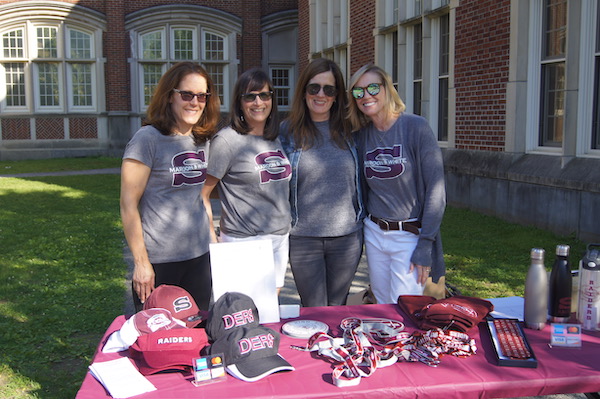 Every season, the Maroon and White parent’s organization hosts a sports awards dinner to recognize athletes for accomplishments in their respective sports. The spring dinner, this year held on Tuesday June 4, honors seniors as the spring season is their last opportunity to compete as Raider athletes. A barbeque is followed by the general awards ceremony, which recognizes seniors for their dedication to Scarsdale athletics. Individual sports teams break into smaller rooms to present sport-specific awards after the ceremony.
Every season, the Maroon and White parent’s organization hosts a sports awards dinner to recognize athletes for accomplishments in their respective sports. The spring dinner, this year held on Tuesday June 4, honors seniors as the spring season is their last opportunity to compete as Raider athletes. A barbeque is followed by the general awards ceremony, which recognizes seniors for their dedication to Scarsdale athletics. Individual sports teams break into smaller rooms to present sport-specific awards after the ceremony.
The Iron Man award is the first of a series of senior awards. The Iron Man honors senior athletes who have completed 12 full seasons of athletic participation, meaning they have played a sport in every high school season. The 2019 Iron Mans were awarded to Alexander Eforo, Chessy Greenwald, Zachary Hoexter, Kazuki Katoh, Andrew Levy, Alexander Mayer, Aliza Mehlman, Nina Metviner, Michael Palermo and Bruno Tassari.
The first of three memorial awards, the Elizabeth Timberger Award, honors an outstanding member of the Scarsdale athletic community. Elizabeth was supportive and influential member of the board of Maroon and White prior to her untimely passing. The Timberger award is given to a senior who helps a team not as a player, but through some other form of participation. The 2019 award went to Mia Bezos, manager of the varsity football team.
The Nina Mooney award is presented to a senior female athlete who displays commitment, enthusiasm, spirit, concern for others and a positive work ethic. Nina Mooney, who passed away in 1991 at the age of 54 after a courageous fight against breast cancer, organized many Maroon and White events and was loved for her kindness and boisterous spirit. Emmeline Berridge, a captain and four-year varsity player for both girls basketball and lacrosse, was the 2019 recipient. Berridge will attend the University of North Carolina in the fall.
The Nonie Knopp Memorial Award honors Knopp, an outstanding member of the Scarsdale community and an avid sports fan who was devoted to Maroon and White as a vice-president and chairperson for the Holiday Basketball Tournament. The award recognizes a male senior varsity player who exemplifies dedication, commitment, spirit, enthusiasm, concern for others and positive work ethic. The 2019 winner of the award was Ben Schwartz, a captain of the varsity ice hockey team and boys golf team who will continue his golf career at Cornell.
The Peppers Award honors Sue Peppers, a former assistant principal of Scarsdale High School, as she remains closely tied to Scarsdale schools and athletics through her daughters, who were scholar athletes at Scarsdale High School. The award recognizes students who combine high standards for academics, sports, and team play. The female Peppers award was presented to Aliza Mehlman, who has distinguished herself in athletics and academics, emerging as a captain in lacrosse and field hockey, as well as maintaining a strong spirit and an impressive academic record. Mehlman will play lacrosse at Stanford. The male Peppers award was presented to Nick Bernard, who was a standout on the boys track and field team. He will continue his track and field career at McGill University.
The Scholar Athlete Honor Society Award is presented to a top male and female student who has excelled in dedication to and performance in his or her sport, and displayed leadership on and off the field of play and high performance in the classroom, with a GPA of 3.5 or higher and accomplished SAT or ACT scores. This year there were two female winners and one male winner. Andrew Bernstein, a 2019 high school All American who broke the school record for career goals won for lacrosse; Sam Felder won for field hockey and lacrosse; and Allison Stafford won for soccer. Bernstein will attend Northwestern in the fall, Felder will attend the University of Virginia and Stafford, who is believed to be the only two-time All New York State girls soccer player in Scarsdale High School history, will continue her soccer career at Amherst.
The Scarsdale Raider Award recognizes the intangible characteristics that represent the spirit of a Scarsdale Raider--- the attitude, work ethic, and leadership qualities that the sports community hopes to instill in all Raider athletes. The winners of the Scarsdale Raider Award were Jack Brosgol for lacrosse; Chessy Greenwald for lacrosse, track and field and field hockey; and Kaitlyn Lee for golf. Brosgol will continue his lacrosse career at Swarthmore; Greenwald will play lacrosse at Wesleyan; and Lee will play golf at Yale.
The ceremony also recognized the 27 SHS athletes who are expected to continue their athletic careers in college:
- Brooke Bensche – Track & Field - MIT
- Nicolas Bernard – Track & Field - McGill University
- Elise Boucher - Cross Country/Track & Field - Smith College
- Jack Brosgol – Lacrosse- Swarthmore College
- Garrett Campbell - Football - Denison College
- Jack Charland – Football - Dickinson College
- Aidan Donovan – Cross Country - Fairfield University
- Sierra Donovan – Track & Field– Amherst College
- Kaitlyn Du – Diving – Massachusetts Institute of Technology (MIT)
- Elizabeth Elcik – Cross country and Track & Field - Santa Clara University
- Andy Fan - Golf - University of Pennsylvania
- Mao Fukada – Swimming – Soka University
- Chessy Greenwald – Lacrosse-- Wesleyan University
- Samantha Ho – Diving- Yale University
- Eric Jacobson - Track & Field - Fordham University
- Cole Kattan – Basketball- SUNY Geneseo
- Kaitlyn Lee - Golf - Yale University
- Danielle Lemisch- Swimming – Lafayette College
- Andrew Levy - Cross Country/Track & Field - Emory University
- Brian Lilly - Crew - Univ of California at San Diego (UCSD)
- John Lloyd - Ski Racing - Hobart and William Smith
- Aliza Mehlman- Lacrosse – Stanford University
- Josh Porter – Football - Colby College
- Renata Pratt - Cheerleading - Elon University
- Ben Schwartz - Golf - Cornell University
- Allison Stafford – Soccer - Amherst College
- Dylan Pflaum-Football-Ohio Wesleyan University
Here are representatives from each team and a brief recap of the season's highlights:
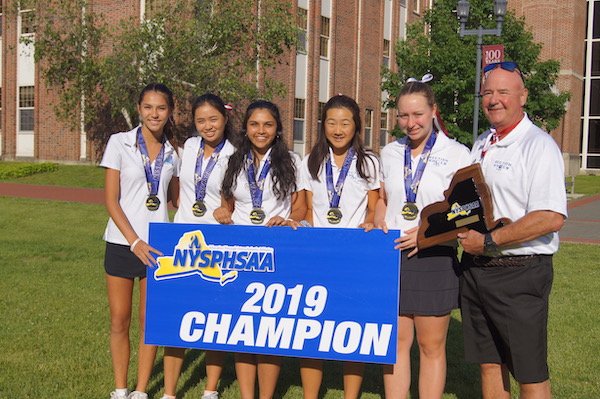 Girls Golf
Girls Golf
States team pictured: Skye Braun, Jackie Lu, Madhavi Shashank, Kaitlyn Lee, Rebecca Maude, Coach Barney Foltman
Girls golf had an “amazing season” according to senior Sarah Abbe. Three girls on the team went to states, Kaitlyn Lee, Jacqueline Lu, and Rebecca Maude. Many girls on the team also went to sectionals. The team won both states and sectionals.
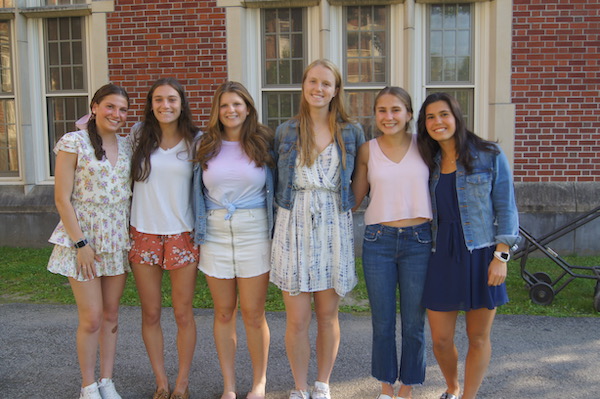 Girls Lacrosse
Girls Lacrosse
Seniors pictured: Aliza Mehlman, Mia Dell'Orto, Lena Glickman, Emmeline Berridge, Samantha Felder, Chessy Greenwald
This season, the girls lacrosse team made it to playoffs. Senior Chessy Greenwald got 100 goals. Chessy also named all-section.
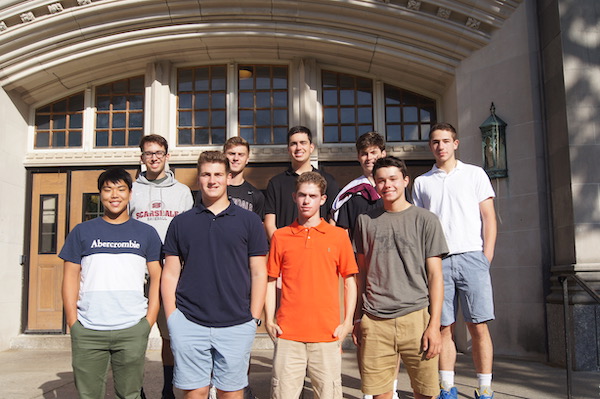 Baseball
Baseball
Seniors pictured: Cole Thaler, Avery Tzamarot, Sam Bernstein, Trevor Lambert, Cole Kattan, Kody Morikuni, Michael DiSanto, Jonah Schneider, Matt Watiker
The boys baseball team did not have their best season this year. Their record at the end of the season was 4 and 12. However, they did score a win against the Suffern Varsity Boys Baseball team, which is the number two team in the entire state.
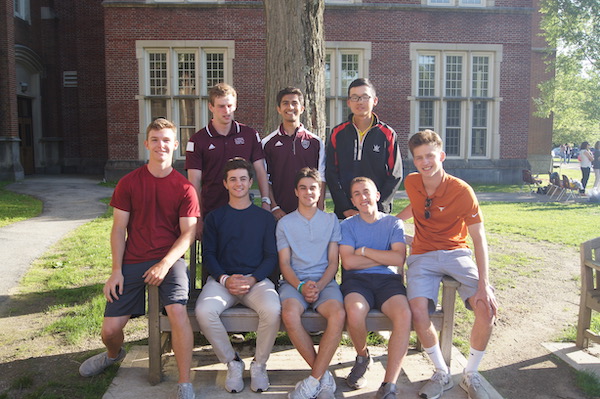 Boys Golf
Boys Golf
Seniors pictured: Henry Kronenberg, Ishwar Mukherjee, Andy Fan, Ben Schwartz, Aidan Londa, Dan Silk, Andrew Kass
The boys golf team had a phenomenal season and was undefeated with a 19 and 0 record. 10 members of the team qualified for for sectionals, which is a record. The team also sent 4 boys to states, at Cornell, and they were the only team to qualify more than one person. 3 boys also went to all-states.
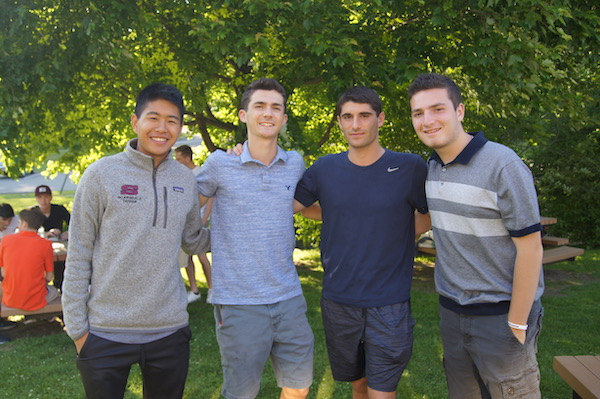 Boys Tennis
Boys Tennis
Seniors pictured: Jose Maronilla, Jordan Ziffer, Dylan Cohn, Jake Singer
The boys tennis team had a stellar 11 and 1 record during the regular season. The team made it to playoffs, but unfortunately lost to Horace Greeley. Two boys went to states, freshman Jason Shuler and junior Nikolai Sahakyan and won the state doubles title. 7 boys also qualified for the all-section tournament.
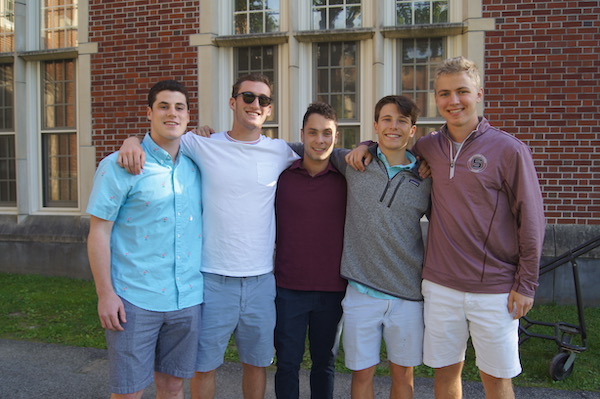 Boys Lacrosse
Boys Lacrosse
Seniors pictured: Will Maybaum, Ben Klein, Zach Reyman, Jackson Bornstein, Jackson Brosgol
Boys lacrosse had a great regular season, with their record being 13 and 3. Although they lost in the playoffs, the boys had a fun time and “rode with the dogs” according to senior Ben Klein. Also, senior Andrew Bernstein made all-American.
Softball
The girls softball team’s record this season was 16 and 5, and the team made it to the sectionals. Some highlights of the season were that the team beat their rival, Mamaroneck, who we haven’t beaten in years. They also beat White Plains, which has the number 1 team in the section and number 4 team in the state. The girls also won their first sectionals game in 11 years.
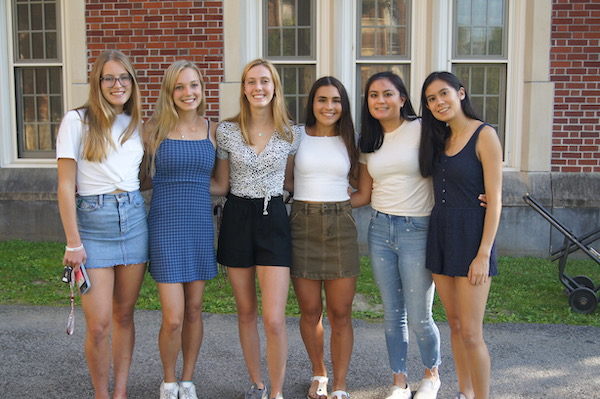 Girls Track & Field
Girls Track & Field
Seniors pictured: Alexandra Wilson, Sierra Donovan, Brooke Bensche, Elizabeth Elcik, Isabelle Boucher, Elise Boucher
The girls SMR(sprint medley relay) qualified for nationals- the relay consists of Annabel Jacobs, Samantha Jahrmarkt, Yurami Van eer, and Sierra Donovan. Sierra Donovan ran a 2:18.71 in the 800m.
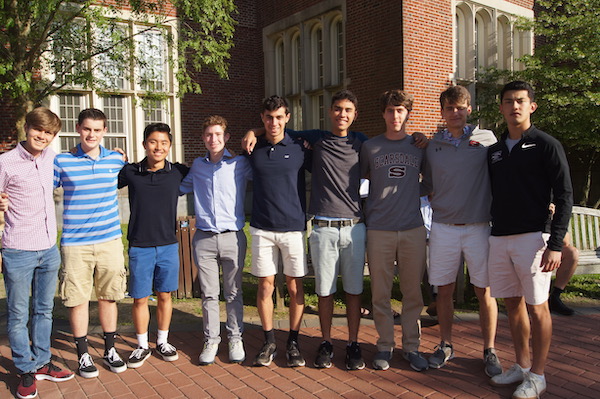 Boys Track & Field
Boys Track & Field
Seniors pictured: Bruno Tassari, Alex Mayer, Kazuki Katoh, Zach Hoexter, Andrew Levy, Omar Van Eer, Michael Palermo, Eric Jacobson, Nicolas Bernard
Alex Friedman ran a 56 second PR(personal record) in the 3200. Daniel Asher ran 4:26.94 in the 1600m(mile). Jake Coleman ran 9:49.45 in the 3200m(2 mile)— just roughly a second and a half off of winning and event and going to states as a sophomore and after being injured at the beginning of the season. Boys 4x800m relay broke the school record set in 2008.
Lange's Deli to Close After 47 Years in Scarsdale
- Details
- Written by: Joanne Wallenstein
- Hits: 34393
 Customers had tears in their eyes when they learned that Lange’s of Scarsdale, a village landmark, would close its doors on Friday May 31. Opened in 1972, the deli looms large in the history of the ‘Dale and has been the favored destination for people of all ages for almost 50 years.
Customers had tears in their eyes when they learned that Lange’s of Scarsdale, a village landmark, would close its doors on Friday May 31. Opened in 1972, the deli looms large in the history of the ‘Dale and has been the favored destination for people of all ages for almost 50 years.
The restaurant has embedded itself in the life of the village, serving hot chocolate and marshmallows at the Christmas tree lighting, grilling burgers and hotdogs at the Sidewalk Sale and serving donuts at Breakfast with Santa.
Their sandwiches are famous among high school alumni who savor the “Grand Canyon” -- chicken cutlet with American cheese, bacon, lettuce, tomato and mayo on a roll and the “Buffalo Bill,” chicken cutlet, lettuce tomato, hot sauce and blue cheese dressing on a roll.
Two sandwiches on the menu were even named after high school alumni – the Mr. Joe – chicken cutlet, bacon, lettuce, tomato, honey mustard and melted mozzarella -- is named after Joe Zakierski and the JCAS with eggplant, fresh mozzarella, tomato, and pesto is named for Jared Casden.
Why the decision to close? Owner Tony Domini shook his head as he listed several reasons for his financial woes. He said that overall business had fallen 50% from Lange’s best years and that their catering business had dried up. For several years, Lange’s was supplying school lunches to the elementary schools, but with the decision to retain Chartwells to provide school lunches, that business was also lost. The opening of the learning commons with a salad bar at Scarsdale High School also contributed to the loss of students coming in for salad at lunchtime.
Though Tony didn’t discuss it, the decision seven years ago to expand into the neighboring site and open a pizzaria may also have contributed to his losses. The new restaurant had to be built out, and the rent had to be paid for both locations. Customers enjoyed the expanded site but did not seem to be consuming much pizza.
One fan noted that people’s dietary habits have evolved as well. Rather than having a Reuben sandwich for lunch they may be opting for healthier choices like an acai bowl. Undoubtedly Lange’s also faced competition from the plethora of online food apps such as Uber eats and Door Dash.
Lange’s was a good neighbor to the Village and served as an informal meeting spot for locals who sat for hours with a cup of coffee and a newspaper. Their outdoor seating area was also a popular hangout and they generated good foot traffic for other stores in the Village. The restaurant employed a tight group of 21 cooks and servers, who will be missed, and will all be looking for new jobs.
Scarsdale Village has been struggling to maintain retail tenants, and the loss of Lange’s, on the busy intersection of Chase Road and Spencer Place, hits hard.
The sad news inspired Deborah Skolnik, poetess and author of Gentle Scarsdale Satire to write a new verse which she graciously shared with us --- and with you:
AULD LANGE'S SYNE
I'm beginning to feel all kind of pangs
to hear they'll soon be closing Lange's.
It's been around since I was a kid--
did you ever go in there? Betcha did!
Their sandwiches are very nice,
and you can always grab a slice,
and there are specials of the day,
and they've always supported the PTA.
We're in a collective state of shock;
this little deli is our rock!
It's sad, and must we worry more
about having another empty store?
Don't close up, Lange's, and leave a zero--
We're holding out for a (turkey) hero!
Copyright Deborah Skolnik, 2019
Feeling sad about Lange’s? Share your comments below.
SHS Students Raise Money To Fight Cancer and Lend a Hand At Hitchcock
- Details
- Written by: Joanne Wallenstein
- Hits: 4454
 From left to right: Dean Glucksman, Jack McEvoy, Max McEvoy, Aidan Mansfield, Marc Ifrah (not in picture: Ford Lenchner, Rahim & Rhomy Mohamed)This spring marked the Fifth Annual Dunk Your Kicks sneaker collection, led by Dean Glucksman and his friends Jack and Max McEvoy, Aidan Mansfield, Marc Ifrah, Ford Lenchner and Rahim and Rhomy Mohamed. The DYK’s campaign and initiative is intended to bring awareness to those families fighting pediatric cancer and to help the environment by keeping old “kicks” out of landfills. The money raised through the resale of this affordable footwear helps low-income and military families living in the U.S. with a child battling cancer.
From left to right: Dean Glucksman, Jack McEvoy, Max McEvoy, Aidan Mansfield, Marc Ifrah (not in picture: Ford Lenchner, Rahim & Rhomy Mohamed)This spring marked the Fifth Annual Dunk Your Kicks sneaker collection, led by Dean Glucksman and his friends Jack and Max McEvoy, Aidan Mansfield, Marc Ifrah, Ford Lenchner and Rahim and Rhomy Mohamed. The DYK’s campaign and initiative is intended to bring awareness to those families fighting pediatric cancer and to help the environment by keeping old “kicks” out of landfills. The money raised through the resale of this affordable footwear helps low-income and military families living in the U.S. with a child battling cancer.
With the support of local businesses and institutions including Barry’s Bootcamp, Flywheel Sports, Pushlab Fitness, Club Pilates in Scarsdale and Ardsley, UFC of Mamaroneck, Westchester Reform Temple, Congregation Kol Ami and Temple Beth-El Synagogue Center of New Rochelle, these boys collected over 250 pairs of gently used sneakers. In addition, Dean held his third consecutive Max Cure Foundation March Madness NCAA basketball bracket and raised over $3,500 for the foundation.
SCOUTS LEND A HAND AT HITCHCOCK
The Scarsdale Boy Scouts Troop 4 helped out its charter organization, Hitchcock Church. The boys assisted with spring planting on Monday, May 6th. Their work can be seen by anyone driving past the church in Greenacres.
